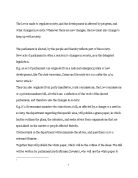What, if anything, makes a marriage contract unlike all other contracts?
Legal Economics05/09/08 What, if anything, makes a ‘marriage contract’ unlike all other contracts? ________________ Marriage can be defined as a personal union of individuals. It is an institution in which interpersonal relationships are acknowledged by the state or by religious authority. Civil marriage is the concept of marriage viewed by the legal system in accordance of marriage laws of the jurisdiction. This type of marriage is common in more developed countries. If the marriage is recognised by the state, the act of marriage changes the personal and social status of the couple (Rees, 2008). Under English law, marriage is seen as an agreement by which a man and a woman enter into a legal relationship by becoming husband and wife. Such a relationship imposes mutual rights and duties. It is often said that marriage is simply an exchange of sexual favours, but marriage also puts forward the idea of a status of the married couple to whom the law assigns legal capacities or incapacities. (Fineman 2006, p. 61). In the case of Hyde v. Hyde in 1996, Lord Penzance defined marriage as “the voluntary union for life of one man and one woman to the exclusion of others” (Shah 2005, p. 95). A contract however, is a promise that the law will enforce. It can be defined as an exchange of promises between two parties, in order to perform or refrain from actions - an agreement
Supreme Court Case analysis - Yemshaw v London Borough of Hounslow (2011) UKSC 3
Essay Question: Case analysis - Yemshaw v London Borough of Hounslow (2011) UKSC 3: The Supreme Court case of Yemshaw v London Borough of Hounslow (2011)[1] , has made headlines, the Daily Mail titled it as “Shout at your spouse and risk losing your home: It's just the same as domestic violence, warns woman judge”[2]. This case became a controversial area, it was scrutinised. Shouting between adults cannot be seen by the courts as domestic violence, but nor should psychological abuse i.e. harassment or verbal abuse, these can cause serious harm to the adults as well as children. It is something to be considered in relation to the threshold of seriousness. Until now the term violence has always meant physical assault. The decision in the case has brought changes to homelessness law and family law, in that the courts have the power to remove someone from the home if they are accused to have been violent against members of the family. In Yemshaw, the issue at hand was, what was the actual meaning of the term “violence” under section 177(1) of the Housing Act 1996, and was it just limited confined within physical abuse or does it extend its scope to other form of violence? This significant case ruled that in domestic violence in relation to homelessness includes not only the aspect of physical abuse but also psychological abuse. But before I look at how the law was
How Has The Law Adapted To Changes In Society With Regard To Marriage And Family?
The law is made to regulate society, and the development is affected by progress, and other changes in society. Whenever there are new changes, the law must also change to keep up with society. The parliament is elected, by the people and thereby reflects part of the society. New acts of parliament is often a reaction to changes in society, as is the delegated legislation. E.g. an act of parliament can originate from a national emergency,crisis or new development, like The Anti-terrorism, Crime and Security Act 2001 after the 9/11 terror attack.[1] They can also originate from party manifestos, royal commissions, the Law commissions or a private members bill, all which are a reflection of the work of the elected parliament, and therefore also the changes in society. E.g. If a Government minister who introduces a bill, as affected by a change or a need in society, the department regarding this specific area, will publish a green paper, in which he/she outlines the plans, the intention, and seeks advice from organisations that are specialised on the matter or people affected thereby. Civil servants in the department will summarise the advice, and pass them on to a relevant Minister. Together they will publish the white paper, which will be the outline of the ideas. The Bill will be written by parliamentary draftsmen (lawyers), who will use the white paper to do so.
Problem Question, Divorce& FInancial Provision
Question Sakina and Raj, now aged 52 and48, met 17 years ago and have been living together. They had two children, Tuscan and Umbria, now aged 15 and 12. However, after Raj discovered that Umbria was not his daughter but George’s instead, he and Sakina split up after 7 years of cohabitation. George was a very wealthy business man. She marries George, who dies a year later. Sakina inherited George’s estate worth £10 million. Two years ago, she and Raj met again. Raj proposed marriage; Sakina accepted on condition that Raj formally agreed that, were their marriage to end within five years, he would agree to a lump sum of £100000 “full settlement”. Raj was at that time unemployed. He agreed to her condition. After the marriage they lived together in the house Sakina had inherited. Raj started a business, using Sakina’s capital. She also provided valuable working experience, whist continuing to bring up the children. The business prospered. A year ago Raj suspected that Sakina was having an affair with Vince. Rather than confront her directly, Raj had her followed by a private detective. She became convinced that she was being stalked by a stranger, suffered a nervous breakdown and is now incapable of looking after the children or assisting with the business. She admits adultery with Vince, but Raj does not want a divorce. She wishes to divorce Raj and marry





